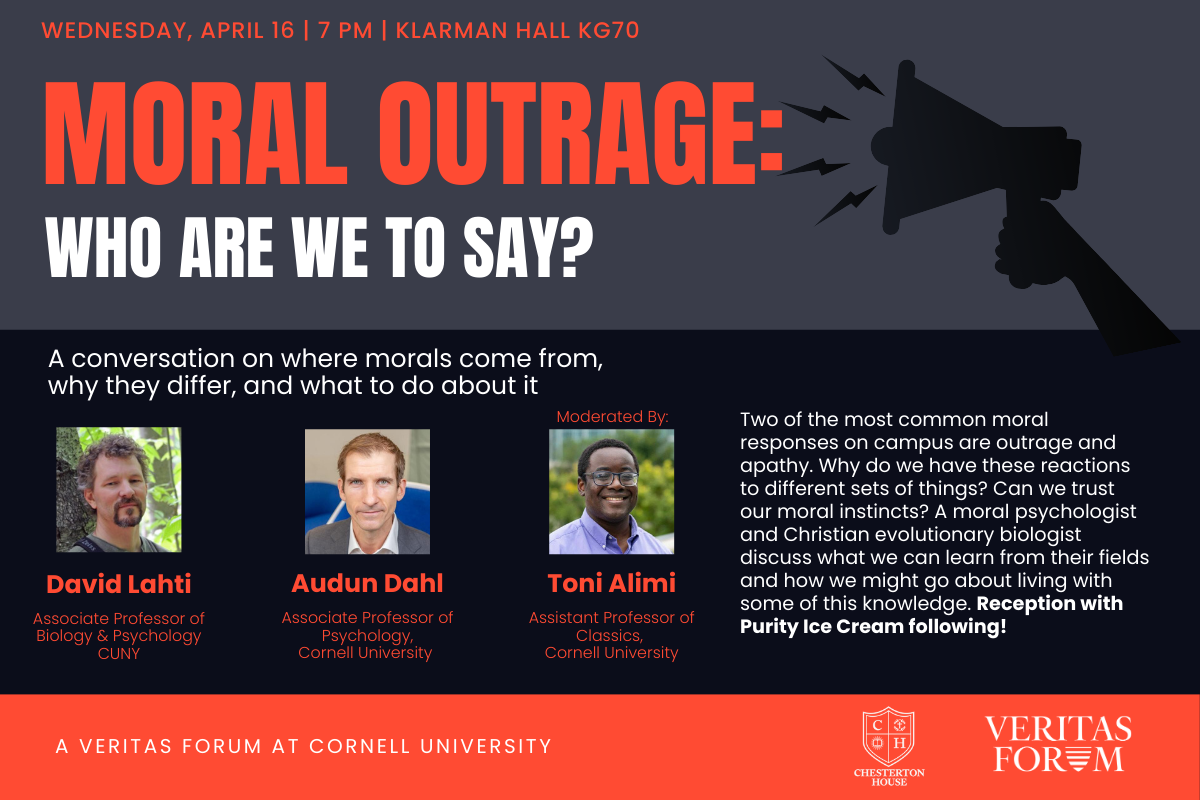
- This event has passed.

Date
April 16 at 7:00 PM - 8:30 PM EDT
Location
Klarman Hall KG70
Veritas Forum brings you:
Moral Outrage
Who Are We to Say?
A conversation on where morals come from, why they differ, and what to do about it.
April 16th, 2025
7:00pm to 8:30pm ET
Klarman Hall KG70
or remotely via Zoom
Reception with Purity Ice Cream to follow!
Register Here
Two of the most common moral responses on campus are outrage and apathy. Why do we have these reactions to different sets of things? Can we trust our moral instincts? Audun Dahl, a moral psychologist and David Lahti, a Christian evolutionary biologist, discuss what we can learn from their fields and how we might go about living with some of this knowledge.
David Lahti; Associate Professor of Biology and Psychology, CUNY
David Lahti is an Associate Professor of Biology at Queens College, City University of New York (CUNY), and is also affiliated with the doctoral faculty in Psychology and Biology at the CUNY Graduate Center. He leads the Behavior & Evolution Laboratory, which focuses on learned behaviors in birds and humans, cultural evolution, rapid trait evolution, and the development of morality and religion.
Lahti holds two PhDs: one in moral philosophy and philosophy of biology from the Whitefield Institute, Oxford, where he explored the contributions of science to understanding morality, and another in ecology and evolutionary biology from the University of Michigan, where he studied rapid evolution in African weaverbirds. His postdoctoral work included research on bird song development and human psychology from an evolutionary perspective.
In addition to his academic work, Lahti integrates his scientific research with his Christian faith, discussing topics such as cultural evolution and the interplay between science and religion. His lab consists of a diverse team working on projects ranging from ornithology to urban ecology.
Audun Dahl; Professor of Psychology, Cornell
I am interested in development of morality across the lifespan. Every day, from infancy to old age, we encounter morally relevant events. We help or hurt another person, or we witness others who help or hurt, in both mundane and life-changing ways. As we develop, and enter new social situations, we encounter new rules for right and wrong behaviors. Religious texts spell out how to pray. Schools teach their students about how to use sources without plagiarizing. The abundance of moral and other principles prompts children and adults to determine, again and again, what makes for right and wrong ways of acting.
The Developmental Moral Psychology Lab studies how we reason, judge, feel, and act around issues of right and wrong across the lifespan. We also study how morality develops through everyday social interactions, starting in early childhood. We use a variety of methods—including laboratory experiments, naturalistic observations, structured interviews, and surveys—to study infants, children, adolescents, and adults from different communities. For instance, we study how infants begin to help and harm others, and how adults form judgments and decisions about complex issues, such as academic integrity and moral dilemmas. Through this range of methods and age groups, we seek to understand both the diversity and the unity of human morality.
Toni Alimi; (moderator) Assistant Professor of Classics, Cornell
My research and teaching span ancient Roman philosophy (specializing in Lactantius and Augustine), intellectual history (focusing on freedom, slavery, law, rule, and authority), contemporary ethics and politics (idem), and philosophy of religion. My first book, Slaves of God, explicates Augustine’s reasons for justifying slavery and argues that slavery is a central theme in his broader ethics and politics.
I’m in the early stages of research for a broader philosophical history of slavery (tentatively titled Slavery: A Philosophical History), which will trace the development of ideas of natural and retributive slavery from their ancient Greek and Roman provenances through late antiquity, medieval and early modern Christianity, into the antebellum United States.
As a Klarman Fellow (2021-2024), I am a postdoctoral associate in Classics with an affiliate appointment in Philosophy. Before Cornell, I earned the Ph.D. in Religion, Ethics, and Politics from Princeton University, the M.A.R. in Ethics from Yale Divinity School, and the A.B. in Religion from Princeton University.
Register Here
